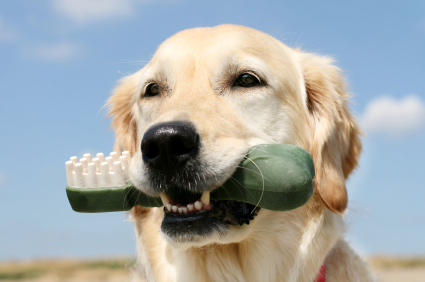 Hummelstown, PA – Dog owners are often plagued by the common issue of their furry friends bad breath, which could indicate a more serious problem. Surprisingly, oral disease is the most commonly diagnosed health problem in pets, with 80 percent of dogs and 70 percent of cats developing symptoms by age two. Research indicates that dental health is just as important for dogs as it is for people, but the reality is that most pets dental health is left uncared for.
Hummelstown, PA – Dog owners are often plagued by the common issue of their furry friends bad breath, which could indicate a more serious problem. Surprisingly, oral disease is the most commonly diagnosed health problem in pets, with 80 percent of dogs and 70 percent of cats developing symptoms by age two. Research indicates that dental health is just as important for dogs as it is for people, but the reality is that most pets dental health is left uncared for.
In order to raise awareness of this growing problem and to help teach pet owners proper preventive care, February has been declared Pet Dental Health Month. Dr. Colin Harvey, Professor of Surgery and Dentistry in the Department of Clinical Studies at the University of Pennsylvania, School of Veterinary Medicine (Penn Vet) said, “Oral health is increasingly recognized as a critical part of general health. Periodontal disease, or gum disease, is very common in dogs, is more frequent and more severe in small dogs than in larger dogs, and is more of a problem in older dogs. There is now good evidence of a relationship between oral health and health of distant organs such as the heart, liver, and kidneys.” This is the same process the disease follows in people, and can be prevented if care is provided early.
Dental disease in dogs is caused by a build up of bacteria in the mouth combined with saliva and food residue caught between the teeth and gums. This becomes a breeding ground for plaque, which can lead to tooth decay, gum disease and tartar. The signs and symptoms that oral attention is necessary include bad breath, sore or bleeding gums, and yellow and brown tartar build-up.
In addition to regular check-ups with your pets veterinarian, there are things you can do as a pet owner to maintain oral health between visits. “Oral hygiene can be commenced at any time, although the earlier in life the better,” said Dr. Harvey. “Owners can brush their pet’s teeth or provide a diet or treats that are effective in retarding accumulation of dental plaque and tartar. The real key is to stick with it; a short term flurry of activity is of little value,” Dr. Harvey added.
Veterinarians recommend allowing your dog just one regular sized dog treat per day to reduce the build up of plaque and tartar.





